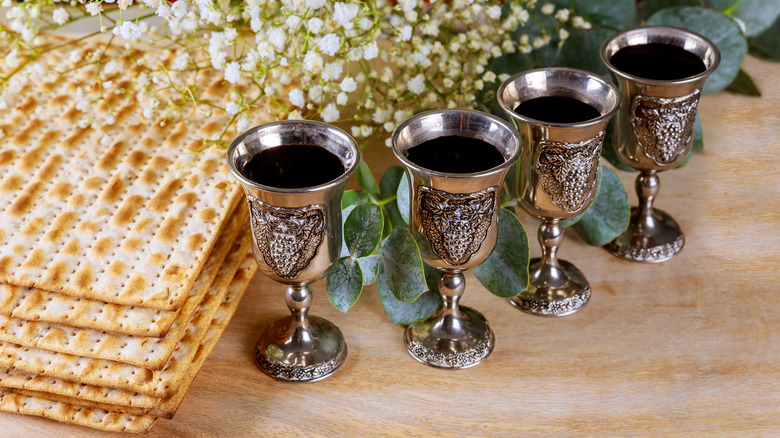Is Wine Kosher By Nature?
Not all Jewish people keep a kosher diet, but those who do must follow a specific set of guidelines about producing, preparing, and consuming food and drink. While one of the most widely-known rules of keeping kosher are that milk cannot be mixed with meat, wine is another beverage that requires careful consideration. The Jewish people have a long history with wine – the beverage is mentioned extensively in the Old Testament of the Bible and Torah, and it was part of sacrificial offerings in the Temple in Jerusalem. While wine is still a part of Judaism practices today, such as being served alongside brisket at a Passover meal, it turns out that not all wine is kosher.
Grapes are naturally kosher, which may lead some to assume that its byproducts are also fair game. However, for most wines to be deemed kosher, they must have been handled entirely by Sabbath-observing Jews, from crushing the grapes all the way to the final bottling step. Non-kosher ingredients or additives cannot be included, and even after the wine has been bottled, it can only be opened and poured by a Sabbath-observing Jew in order for it to remain kosher.
Koshering wine is connected to the entirety of its creation process, but so long as these rules are followed, any varietal of wine from anywhere in the world can be kosher. Plus, there's another way for wine to be made kosher, even if it's handled by non-Jews.
A brief history of kosher wine
A kosher diet is one of the ways in which the Israelite people set themselves apart from others, based on the edicts of the God of Israel, or Yahweh. These dietary laws, called kashrut, are outlined in the books of Exodus, Deuteronomy, and Leviticus in the Torah and Bible. Since early history, Kashrut-following Jews had to ensure that everything they consumed, including wine, was only handled by members of their nation.
Wine in particular was involved in temple rituals that honored Yahweh; however, it was also used by non-Jewish nations as offerings to their own gods, which were considered idols by the Jews. To ensure that no wine used to honor idols was also mistakenly used to honor Yahweh, it was mandated that only Jews could make and handle their own wines — thus, most kosher wines still adhere to this definition today.
Despite all of this careful handling, there was still room for kosher wines to become cross-contaminated, so to speak. Even if the wine was produced with kosher methods, as soon as it was handled in a non-kosher way (e.g. picked up by a non-Jew, or used as an offering for idolatrous gods), the bottle would be forfeit. To eliminate this risk, Jews came up with an alternative koshering method called the mevushal process, which is still widely practiced today. This extra step makes producing and enjoying kosher wine a lot less complicated.
What is the mevushal process of koshering wine?
The mevushal process – essentially a pasteurization step — makes it possible for wines created by non-Jews to become kosher. These types of wines will display both the kosher symbol and the term "mevushal" (meaning "cooked") on their labels. To make these beverages, the "grape must" (de-stemmed and crushed grapes used to distill the wine) is flash-heated to 185 degrees Fahrenheit for a very short period of time. Grape must is also used to make a handy condiment called saba.
After undergoing the mevushal step, a wine can be handled by anyone and still be kosher. These options are popular at events like Jewish weddings and bar and bat mitzvahs, where non-Jewish servers may have to serve the wine. Although the pasteurization process has improved over time, creating less impact on a wine's flavor and longevity, some drinkers might express reservations about the way the final result tastes. "Cooking" a wine can indeed damage its flavor and integrity, but modern mevushal is still a big step up from the old days, when the wine had to be boiled.
With all that being said, very few mevushal wines are considered a premium product for vino lovers. If you want to enjoy some of the finest examples of kosher wine, you'll want to seek out bottles produced with the traditional kosher method.



